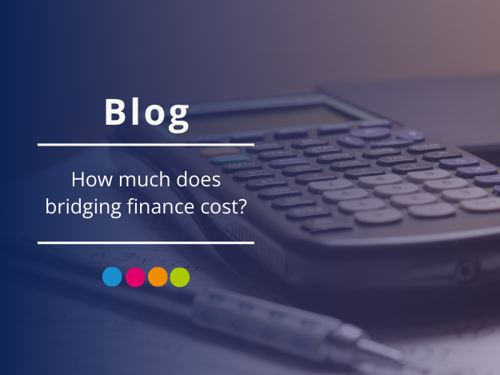
Bridging loans are a quick way to access funds when needed, but how much do they cost and are they worth it? In this blog, we'll break down the costs to help you decide if it is the right choice for you.
How much does a bridging loan cost?
The cost depends on several factors, some of which may include:
Loan size and term
The larger the loan, the higher the repayment amount. Similarly, the length of the loan term can affect the cost too.
A longer term can increase your costs because interest accrues over time. However, a shorter term can reduce costs by limiting the interest charged.
Interest rate
The interest rate determines how much you'll pay for the loan overall. Put simply, a lower rate means you pay less, and a higher rate means you pay more. The interest rate you get depends on your finances, the lender, market conditions, and the type of project. If the project is considered to be risky, the lender may increase the rate.
Since these loans are short-term, your interest is charged monthly rather than annually. This can make them more expensive than mortgages. However, because they’re for a shorter period, they’re not paid off over many years.
Deposit
Most lenders require a deposit, which is often around 25% of the property value. However, the exact amount can vary depending on the lender.
Product fees
Usually, lenders charge a product or arrangement fee for setting up your loan. This fee can be a fixed amount or a percentage of the loan and covers the cost of arranging and processing your application.
Broker fees
If you use a broker to find a loan, you may have to pay a fee for their work and support. This fee can be a flat rate or a percentage of the loan amount.
Some brokers may allow you to add the fee to the loan, so you don't need to pay it straight away. However, this means it will incur interest. So, be sure to research and understand all the terms of your loan before moving forward.
Valuation costs
Since these loans are secured against a property you own, the lender will need to assess its value. This is to ensure the property is worth enough to cover the loan if you can't make the payments.
A desktop valuation is sometimes able to be carried out, which means the property is assessed virtually. This approach can save both time and money, making it a more cost-effective option.
Legal costs
Since there will be solicitors involved in the process, both you and the lender may have legal costs. Typically, you will be responsible for covering these expenses, but some lenders may offer to cover them as part of a promotion or incentive.
The exact costs will depend on the solicitor handling the process. Lenders and brokers often have preferred solicitors they work with regularly and can recommend, so it’s worth asking them for advice.
Drawdown/admin fees
Some lenders charge a drawdown or admin fee to access your loan. These fees can vary, so it's important to check the details with your lender.
Exit fee
Exit fees are charged by the lender when you repay your loan in full. They may be calculated as a percentage of the total loan amount or set as a fixed flat fee. However, not all lenders have exit fees, so it’s important to review the terms carefully before proceeding. Understanding these details upfront can help you avoid unexpected costs.
Summary
Bridging loans can be a solution when you need quick access to funds, but it's important to understand the costs involved before proceeding. The total cost can vary depending on factors like the loan size, term, interest rate, and any associated fees such as product fees, broker fees, and legal costs.
Before deciding if it is right for you, make sure you research all the potential costs and understand the terms offered by lenders. By doing so, you can make sure that the loan fits your needs and financial situation. If you’re unsure, speaking with an adviser may help guide you through the process.
Loans are secured against property. Think carefully before securing other debts against your home. Your home may be repossessed if you do not keep up repayments on a mortgage or any other debt secured on it.




